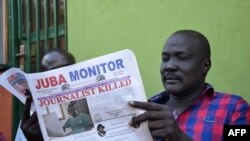Ambassador Michael J. Adler made the remarks Thursday in Juba during the launch of the $12 million Sustainable Independent Media Activity (SIMA) project funded by the United States Agency for International Development or USAID.
Adler said the transitional government should support independent media to play its critical nation-building role in South Sudan.
“We renew our call for the transitional government to allow journalists to work without fear of harassment, detention or violence. Journalists must be free and empowered to fulfill their essential function so this country can become a strong and stable democracy,” Adler said.
The SIMA project aims to improve access to credible, accurate and reliable information for South Sudanese. The three-year project will be implemented by USAID partners, including the International Research & Exchange Board (IREX).
Linet Omwange, deputy chief of party of IREX in South Sudan, says the project will prioritize the engagement of local expertise, build capacity of radio stations and promote gender equality.
“The baseline will inform customized curriculum development, dubbed 'Breaking the Barriers,' that will further provide training of trainers, and will be conducted to cover various topics including gender norms, transformation, masculinities and gender continuums,” Omwange said.
Adler, the U.S. top diplomat in South Sudan, said freedom of expression, freedom of the press and strong media institutions are essential building blocks for a successful society.
“Media has the power to engage South Sudanese citizens in decisions about their future. A strong and independent media will encourage the development of government institutions to respond to the needs of the people and protect human rights,” Adler said.
Aya Benjamin Warille, South Sudan’s minister for gender, child and social welfare, who also attended the launch of the project, says media is key in addressing gender-based violence in the country.
“Like in many other countries, in South Sudan, the media plays a very important and crucial role in enlightening and educating the people against bad practices in the society like forced marriage, rape, human trafficking among others. It also aids public involvement through advocating issues and transferring knowledge, skills, technologies to the people in the country,” Warille said.
Freedom House, an independent U.S. watchdog dedicated to the expansion of freedom and democracy worldwide, says South Sudan’s transitional constitution guarantees freedom of the press, but this right is not being respected. The group says the government censors, harasses and arrests journalists, a charge the government has repeatedly denied.
In August 2021, the national security service closed Radio Jonglei and briefly detained some of its journalists after one of its staff members interviewed a protest organizer. The station was allowed to reopen in September after apologizing to authorities.





![Press Freedom Concerns Arise Ahead of Pope's SSudan Visit [4:55]](https://gdb.voanews.com/093e0000-0a00-0242-dc9e-08da0868a982_w33_r1.jpg)

